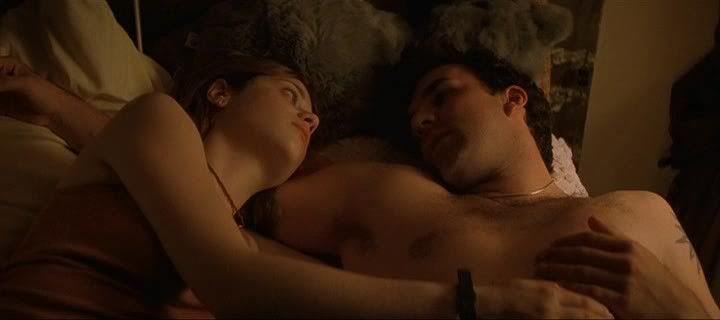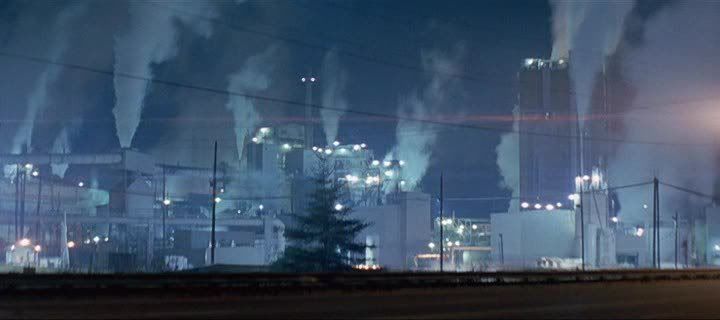
David Gordon Green's second film All the Real Girls, much like its quietly affecting predecessor George Washington, doesn't seem like much. It's a simple love story, tenderly and sympathetically told without fuss or artificial drama. Indeed, the love story itself appears as just one thread within the film's loose, meandering chronicle of life in a small, rural town with a beautiful atmosphere but not much to do. Green spends some time with the town's inhabitants, these young fuck-ups and nobodies who sit around drinking beers, fixing cars, and screwing the local girls who get passed around from guy to guy with little emotion involved. There's a sadness, an understated melancholy, that seems to hang around these people like the hazy early morning fog that occasionally drifts across the cracked, sun-baked ground. Green knows how to capture these people, letting their stories unravel in small increments, snatched fragments of moments that seem to cut off in mid-thought. The editing is elliptical, sometimes maddeningly so, and the film's structure is free associative. Little bits of story show through here and there in between meditative shots of the town's gorgeous Appalachian mountain surroundings, or brief restful moments that seem to have nothing to do with the narrative and everything to do with the way these people really live their lives. It's a unique romance where the director seems as interested in a sunset landscape devoid of people, or in the male lead's poignant relationship with his girlfriend's Down syndrome younger brother, as he is in the main romantic storyline.
Still, it's undeniable that the main story here, the center around which everything else is arranged, is the tentative first love of Paul (Paul Schneider, who also co-wrote the script with Green) and Noel (Zooey Deschanel). Noel is the sister of Paul's best friend Tip (Shea Whigham), a local rabble-rouser who knows all too well about Paul's checkered history with girls, his habit of always becoming the "asshole ex-boyfriend" when he's down with his latest score. This tension could have provided the essential drama for a more typical romance, and it does threaten to boil over periodically in the first half of the film, but then Green pulls a surprise by having Tip and Paul quietly, lovingly reconcile their differences, in a scene almost as sweet as any between the young lovers themselves. Even so, though there are plenty of "guy bonding" moments like this between these simple guys and their friends, the heart of the film is the sometimes troubled romance between Paul and Noel, and it's a remarkably sweet and sincere onscreen romance that Green is presenting here.
Green's characters are inevitably interesting because they seem torn, like his films in general, between realism and stylization. His dialogue has a peculiar, halting quality that is unlike anything else I've heard. This is certainly not a Hollywood-clever romance where the leads simply trade quips and verbally spar for two hours, kissing in between. At the same time, though it's tempting to ascribe the dialogue's awkward, sometimes strained quality to a quest for realism, capturing the way people really talk to each other, it's not quite that either. His characters definitely don't speak like real people, but the rhythms of their conversations, the pauses, the moments that seem natural and improvised, the failed attempts at jokes: these things do feel real anyway. These characters may be delivering Green's stylized lines, and sometimes stumbling over the awkward phrases he puts in their mouths, but even so their reality is hard to deny. It helps that the dialogue, even when it oversteps its bounds, never errs on the side of cliché. The writing sometimes seems too willfully idiosyncratic, too quirky for its own sake, but it never interferes with the essential reality of these characters and this place.

A few more words are probably necessary, in fact, about the remarkable lengths that Green goes to establish a sense of place. His visual rhythms and his concern for landscape have often been attributed (probably rightly) to the influence of Terrence Malick, and yet the small town in this film seems to have an even closer relationship with the slightly surreal rural town of David Lynch's Twin Peaks. There are shots of a local mill that directly reference the famous opening credits of Lynch's early 90s TV series, juxtaposing serene nature with industrial processes, cutting between peaceful landscape shots and grinding rotors or the pulsating needles of an industrial sewing machine. Green, like Lynch, has real affection for this milieu, for the beauty created by this tension between man-made structures and unblemished nature. He seems to find equal beauty, and equal capacity for awe, in an orange-hued sunset and a factory with smoke billowing out, lit in the night by iridescent blue light. At one point, after a traumatic argument triggers a break in the couple's romance, Green traces the passage of time with a lengthy sequence in which the film's characters are only seen in random, very brief moments, speaking at most fragments of dialogue. The bulk of this segment is instead dedicated to shots of the town's unpopulated outskirts, time lapse clouds speeding by overhead as the camera takes in this gorgeous rural area and the downtrodden people who inhabit it.
This is a sweet, warm, ambiguous film that seems to be only scratching the surface of these characters' lives. There's an impression that Green is deliberately keeping his distance, allowing these people to retain their mystery and their uniqueness. What the camera shows are fragments of conversations that cut away in mid-sentence, and isolated moments of inactivity snatched from days that seem to consist of nothing but this aimless passivity. There are also moments of unimaginable joy. Green has a powerful sense of humor, but it shows up in the oddest, most unexpected places, and rarely in the form of a joke. Instead, there are moments that hit one with an inexplicable force, eliciting genuine gales of laughter at the absurdity of it all. In one scene, Paul and his clown mother (Patricia Clarkson) entertain a group of sick kids at a hospital. In another, Paul executes some wonderfully silly dance moves behind Noel's back, in the middle of a bowling alley; "I could do this for an hour," he says, and I might've been willing to watch. Green earns another burst of laughter with the scene where Paul enters a stock car race, with a priceless payoff. As usual, Green increases the humor with understatement; the humor isn't overplayed, but casually revealed in the middle of the scene when the camera pulls back for a wide view. One of the best minor characters, the sleazy but good-hearted Bust-Ass (Danny McBride), also gets the film's best line: when asked if he likes waffles or French toast, he says, "The places I usually go ain't that fancy."
With characters like this, in a down-home rural milieu where nothing much ever happens, All the Real Girls could've easily slipped into condescension. But Green's affection for these characters is always apparent. For these people, saying "I'm stupid" isn't a put-down, it's a declaration, an acknowledgment of truth, and Green never mocks them for their simplicity, nor does he fall into the reverse trap of mythologizing them too much. They're simple, maybe stupid, limited in their experiences and their ambitions alike, and it's unlikely that most of them will ever leave this small town. Even so, within these confined boundaries, the images and moments that make up this film's patchwork portrait are rich and emotionally fertile. Green finds a lot to love in these characters, approaching them and their stories on their own terms, and comes away with a small gem of a romance and a fine sophomore film.

No comments:
Post a Comment